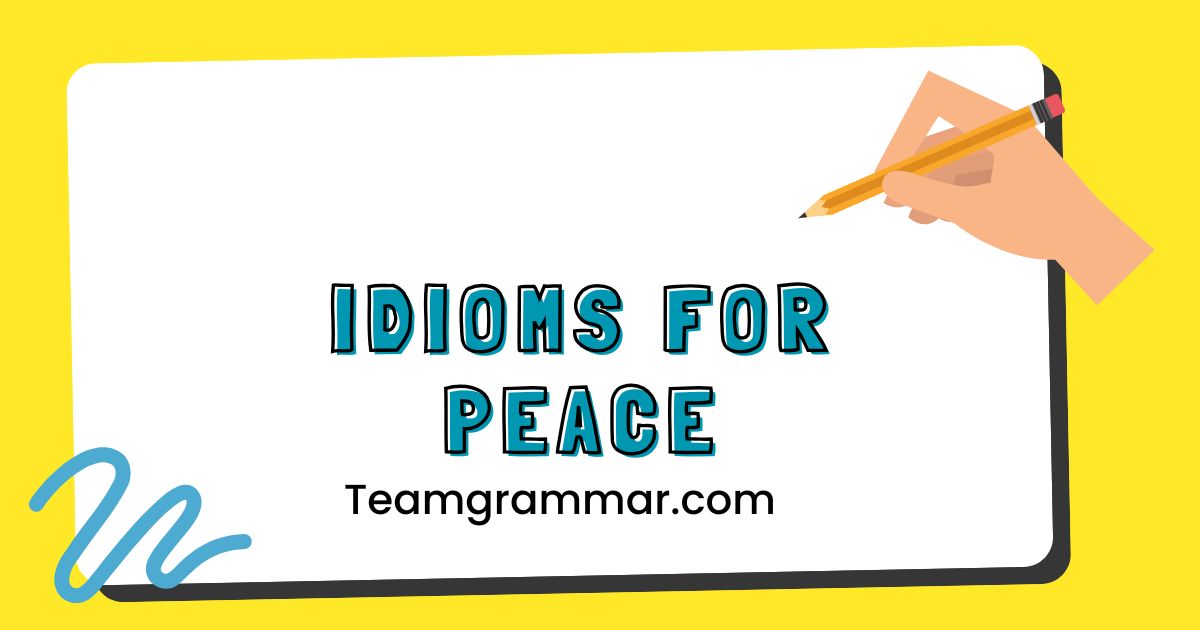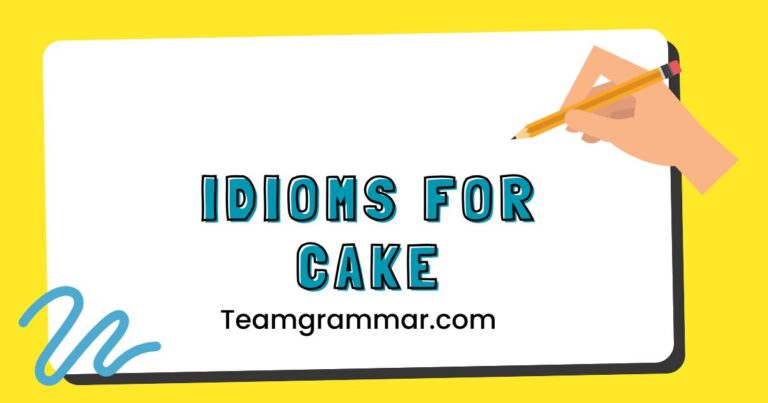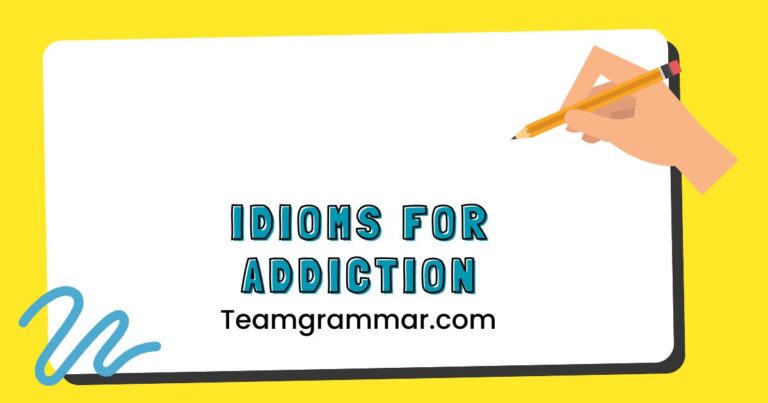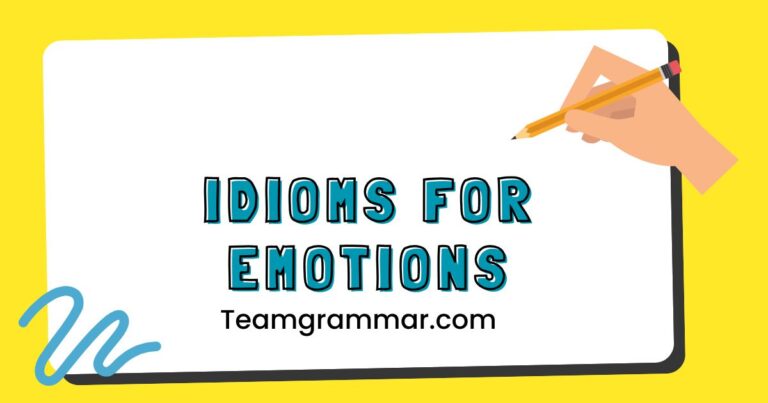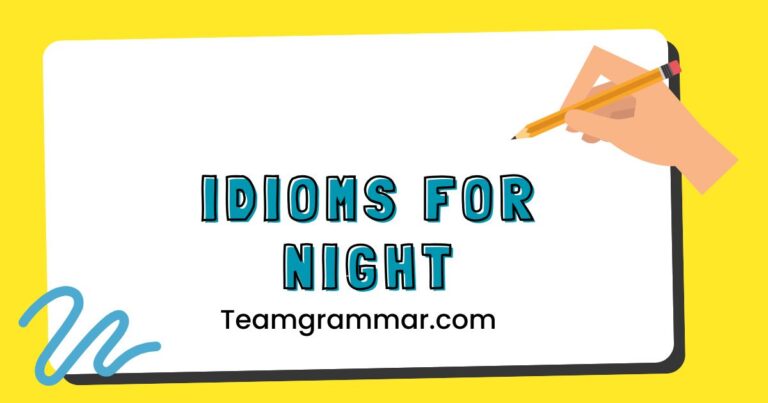45 Idioms for Peace: A Comprehensive Guide
Idioms are an integral part of the English language, adding color and depth to our conversations and writing. Understanding idioms, especially those related to peace, is crucial for effective communication and nuanced comprehension.
This article explores a variety of idioms related to peace, providing definitions, examples, and practical exercises to enhance your understanding. Whether you’re an English language learner, a teacher, or simply someone who enjoys exploring the richness of the English language, this guide will provide valuable insights and practical skills.
Table of Contents
- Introduction
- Definition of Idioms and Peace Idioms
- Structural Breakdown of Peace Idioms
- Types and Categories of Peace Idioms
- Examples of Peace Idioms
- Usage Rules for Peace Idioms
- Common Mistakes with Peace Idioms
- Practice Exercises
- Advanced Topics in Peace Idioms
- FAQ
- Conclusion
Definition of Idioms and Peace Idioms
Anidiomis a phrase or expression whose meaning cannot be understood from the literal meanings of its individual words. Instead, it has a figurative meaning that is known through common usage.
Idioms add color, depth, and cultural context to language, making it more expressive and interesting.
Peace idiomsare a subset of idioms that specifically relate to themes of peace, harmony, agreement, and the absence of conflict. These idioms often use metaphors and figurative language to convey the idea of tranquility, resolution, and reconciliation.
Understanding peace idioms can help you express complex ideas about peace in a concise and impactful way.
Classification of Idioms
Idioms can be classified in various ways, including:
- Conceptual Idioms: Rooted in metaphors that define a concept (e.g., bury the hatchet).
- Figurative Idioms: Rely on metaphorical or symbolic meaning (e.g., olive branch).
- Literal Idioms: While technically idioms, they can be understood more directly (e.g., live in peace).
Function of Peace Idioms
Peace idioms serve several important functions in communication:
- Expressing Complex Ideas: They allow speakers to convey nuanced concepts about peace in a concise manner.
- Adding Emphasis: Idioms can add emphasis and emotional weight to statements about peace.
- Enhancing Cultural Understanding: They provide insight into cultural perspectives on peace and conflict resolution.
Contexts for Using Peace Idioms
Peace idioms are used in a variety of contexts, including:
- Political Discourse: To discuss international relations, conflict resolution, and diplomacy.
- Personal Relationships: To describe efforts to resolve conflicts and maintain harmony.
- Literature and Art: To explore themes of peace, war, and reconciliation.
- Everyday Conversation: To express hopes for peace and harmony in various aspects of life.
Structural Breakdown of Peace Idioms
Understanding the structure of peace idioms involves recognizing the common elements and patterns that make them unique. Many peace idioms rely on metaphorical language, using concrete objects or actions to represent abstract concepts related to peace.
Metaphorical Elements
Many peace idioms use metaphors to convey their meaning. For example, the idiom “bury the hatchet” uses the act of burying a weapon (the hatchet) to symbolize the end of hostilities and the beginning of peace.
The hatchet represents conflict, and burying it represents the act of ending that conflict.
Symbolic Actions
Some peace idioms involve symbolic actions that represent the process of achieving peace. For instance, “extend an olive branch” uses the act of offering an olive branch (a symbol of peace) to represent a gesture of reconciliation or goodwill.
The olive branch symbolizes peace, and extending it symbolizes the act of offering peace.
Common Patterns
Peace idioms often follow certain patterns, such as:
- Action + Object: Bury the hatchet (action: bury; object: hatchet)
- Verb + Preposition + Noun: Live in peace (verb: live; preposition: in; noun: peace)
- Adjective + Noun: Lasting peace (adjective: lasting; noun: peace)
Types and Categories of Peace Idioms
Peace idioms can be categorized based on their themes and the types of peace they describe. Here are some common categories:
Idioms Related to Ending Conflict
These idioms describe actions or situations that lead to the end of conflict or hostility.
Idioms Related to Maintaining Harmony
These idioms focus on actions or situations that promote and sustain peace and harmony.
Idioms Related to Symbolic Gestures of Peace
These idioms involve symbolic actions or objects that represent a desire for peace or reconciliation.
Idioms Related to States of Peace
These idioms describe conditions or situations characterized by peace, tranquility, and harmony.
Examples of Peace Idioms
This section provides an extensive list of peace idioms, categorized for clarity. Each idiom is defined and illustrated with example sentences.
Ending Conflict
The following table presents idioms that signify the end of conflict, along with their meanings and example sentences.
| Idiom | Meaning | Example Sentence |
|---|---|---|
| Bury the hatchet | To make peace; to end a quarrel. | After years of feuding, the two families decided to bury the hatchet. |
| Call a truce | To agree to stop fighting for a period of time. | The warring factions called a truce to allow humanitarian aid to reach the civilians. |
| Cry uncle | To give up; to admit defeat. | After being relentlessly tickled, the child finally cried uncle. |
| Lay down arms | To surrender; to stop fighting. | The rebels agreed to lay down arms after negotiations with the government. |
| Kiss and make up | To reconcile after a quarrel. | The siblings always kiss and make up after their arguments. |
| Patch things up | To resolve a disagreement or conflict. | They managed to patch things up after their misunderstanding. |
| Turn the other cheek | To respond to an injury without retaliation. | He decided to turn the other cheek and not respond to the insult. |
| Smoke the peace pipe | To make peace. | The leaders from both tribes met to smoke the peace pipe and end the conflict. |
| Heal the rift | To restore friendly relations. | They worked hard to heal the rift that had developed between them. |
| Bridge the gap | To connect two things that are very different. | The negotiations helped to bridge the gap between the two opposing sides. |
| Reach a compromise | To come to an agreement by mutual concession. | After lengthy discussions, they were able to reach a compromise. |
| Settle a score | To get revenge. | They decided to settle the score peacefully through mediation. |
| Clear the air | To resolve misunderstandings. | A frank discussion helped them clear the air and move forward. |
| Iron out differences | To resolve disagreements. | The committee met to iron out their differences and reach a consensus. |
| Meet halfway | To compromise. | Both parties were willing to meet halfway to resolve the issue. |
| Make amends | To do something to correct a past mistake. | He tried to make amends for his earlier behavior. |
| Let bygones be bygones | To forget past offenses. | They decided to let bygones be bygones and start anew. |
| Wipe the slate clean | To start over. | They decided to wipe the slate clean and give their relationship another chance. |
| Draw a line under something | To put an end to something. | It’s time to draw a line under the past and focus on the future. |
| Turn over a new leaf | To change one’s behavior for the better. | He promised to turn over a new leaf and become a better person. |
| Peace out | Informal way of saying goodbye. | “I’m heading out now, peace out!” |
| Bury the lead | Addressing conflict by starting with more important information. | Instead of focusing on minor details, let’s bury the lead and discuss the core issues. |
| Keep the peace | To maintain order and avoid conflict. | The police were there to keep the peace during the demonstration. |
| Paper over the cracks | To conceal problems temporarily. | They tried to paper over the cracks in their relationship, but the underlying issues remained. |
Maintaining Harmony
The following table presents idioms that describe maintaining harmony and peaceful relationships.
| Idiom | Meaning | Example Sentence |
|---|---|---|
| Live in peace | To exist harmoniously. | The neighbors live in peace and help each other out. |
| Get along | To have a good relationship. | The siblings get along very well and rarely argue. |
| Keep the peace | To maintain order and avoid conflict. | The mediator worked hard to keep the peace between the two parties. |
| Go with the flow | To adapt to circumstances; to be flexible. | Sometimes it’s best to go with the flow and not resist change. |
| Smooth things over | To resolve a conflict or disagreement. | He tried to smooth things over after the misunderstanding. |
| Hold out an olive branch | To offer reconciliation. | They decided to hold out an olive branch to their former rivals. |
| Keep an even keel | To remain calm and steady. | He managed to keep an even keel despite the stressful situation. |
| Walk on eggshells | To be very careful not to offend someone. | Ever since the argument, he felt like he was walking on eggshells around her. |
| Find common ground | To discover shared interests or beliefs. | They tried to find common ground to build a stronger relationship. |
| Turn the tide | To cause a reversal of fortune. | His efforts helped to turn the tide and bring about positive change. |
| Pour oil on troubled waters | To calm a difficult situation. | The diplomat tried to pour oil on troubled waters during the tense negotiations. |
| In sync | In agreement or harmony. | The team members were in sync and worked well together. |
| Peace of mind | A state of mental calmness and tranquility. | Meditation helps him achieve peace of mind. |
| Harmony in the home | A peaceful and pleasant home environment. | They valued harmony in the home above all else. |
| A happy medium | A compromise that satisfies everyone. | They found a happy medium that suited both their needs. |
| On good terms | Having a friendly relationship. | They remained on good terms despite their divorce. |
| In agreement | Sharing the same opinion or feeling. | The committee was in agreement on the proposal. |
| Well-adjusted | Emotionally stable and able to deal with stress. | The children were well-adjusted and happy. |
| A balanced approach | A fair and reasonable way of dealing with things. | They took a balanced approach to the problem. |
| A level playing field | A situation in which everyone has an equal opportunity. | The new regulations created a level playing field for all competitors. |
| Find middle ground | To find a position acceptable to all parties. | They tried to find middle ground in the negotiations. |
| In accord | In agreement; harmonious. | The two nations were in accord on the trade agreement. |
| In unison | Speaking or acting together harmoniously. | The choir sang in unison. |
| A win-win situation | A situation where everyone benefits. | The deal was a win-win situation for both companies. |
Symbolic Gestures of Peace
The following table presents idioms that involve symbolic gestures of peace and reconciliation.
| Idiom | Meaning | Example Sentence |
|---|---|---|
| Extend an olive branch | To offer reconciliation or peace. | The company decided to extend an olive branch to its competitors. |
| Wave a white flag | To surrender; to indicate a desire for peace. | The besieged soldiers waved a white flag to signal their surrender. |
| Break bread together | To share a meal in friendship. | They decided to break bread together to foster better relations. |
| Sign on the dotted line | To formally agree to something. | Both parties were ready to sign on the dotted line and finalize the agreement. |
| Shake hands on it | To seal an agreement. | They shook hands on it to confirm their commitment. |
| Lay down one’s sword | To stop fighting; to surrender. | The knight decided to lay down his sword and seek a peaceful resolution. |
| Make a peace offering | To give a gift or gesture to show remorse. | He brought flowers as a peace offering after the argument. |
| Offer the hand of friendship | To offer a friendly relationship. | The new ambassador offered the hand of friendship to the host country. |
| Present a token of peace | To give something to symbolize peace. | They presented a token of peace to commemorate the treaty. |
| Build bridges | To improve relationships between people or groups. | The organization aims to build bridges between different cultures. |
| Hold out a hand | To offer help or support. | They were willing to hold out a hand to those in need. |
| Extend a helping hand | To offer assistance. | He extended a helping hand to his neighbor during the crisis. |
| Give the benefit of the doubt | To believe someone is telling the truth even if you’re not sure. | I decided to give him the benefit of the doubt and trust his explanation. |
| Show goodwill | To display kindness and cooperation. | The company showed goodwill by donating to the charity. |
| Make a gesture of goodwill | To do something to show kindness. | They made a gesture of goodwill by offering free services. |
| Smoke signals | Communicate from a distance. | Their friendly gestures were like smoke signals, indicating a desire for reconciliation. |
| Peace sign | A hand gesture representing peace. | They flashed the peace sign to show their support for the movement. |
| Exchange vows | To make promises to one another. | They exchanged vows, promising to cherish each other forever. |
| Pass the peace pipe | To share a symbol of peace and friendship. | They passed the peace pipe as a symbol of unity and reconciliation. |
| Hold hands | To show unity and support. | The protesters held hands to demonstrate their solidarity. |
| Form a circle | To create a symbol of unity and inclusion. | They formed a circle to express their shared values. |
| Share a meal | To foster camaraderie and understanding. | They decided to share a meal to get to know each other better. |
| Offer a handshake | To express agreement and respect. | They offered a handshake to seal the deal. |
| Give a hug | To show affection and support. | She gave him a hug to comfort him in his time of need. |
States of Peace
The following table presents idioms that describe conditions or situations characterized by peace, tranquility, and harmony.
| Idiom | Meaning | Example Sentence |
|---|---|---|
| Halcyon days | A period of peace and tranquility. | The couple reminisced about the halcyon days of their youth. |
| A land flowing with milk and honey | A place of abundance and prosperity. | The immigrants dreamed of finding a land flowing with milk and honey. |
| Easy street | A life of comfort and wealth. | After winning the lottery, they were finally on easy street. |
| In a good place | In a positive state of mind. | She was in a good place after overcoming her challenges. |
| Sitting pretty | In a comfortable or advantageous situation. | With their investments doing well, they were sitting pretty. |
| Living the dream | Enjoying a perfect or ideal lifestyle. | After years of hard work, he was finally living the dream. |
| At peace with oneself | Content and accepting of one’s life. | After years of searching, she was finally at peace with herself. |
| In clover | Living in luxury and comfort. | After the successful business deal, they were in clover. |
| On cloud nine | Extremely happy. | She was on cloud nine after receiving the job offer. |
| A bed of roses | A life of ease and luxury. | Life is not always a bed of roses; there are challenges to overcome. |
| Serene atmosphere | A calm and peaceful environment. | The garden provided a serene atmosphere for relaxation. |
| Tranquil setting | A peaceful and quiet place. | The lake was a tranquil setting for a weekend getaway. |
| Harmonious relationship | A friendly and peaceful connection. | They enjoyed a harmonious relationship based on mutual respect. |
| Untroubled existence | A life free from problems and worries. | He longed for an untroubled existence in the countryside. |
| Peaceful coexistence | Living together without conflict. | The two communities achieved peaceful coexistence after years of tension. |
| Calm waters | A peaceful and stable situation. | After the storm, the ship sailed on calm waters. |
| Smooth sailing | Easy and trouble-free progress. | After the initial challenges, the project was smooth sailing. |
| Quiet life | A simple and peaceful way of living. | They retired to the countryside to enjoy a quiet life. |
| Easygoing nature | A relaxed and tolerant personality. | Her easygoing nature made her a pleasure to be around. |
| Carefree attitude | A lack of worry or concern. | He adopted a carefree attitude towards life’s challenges. |
| Blissful ignorance | Happiness due to a lack of awareness of potential problems. | They lived in blissful ignorance of the impending crisis. |
| A haven of peace | A place of tranquility and refuge. | The library became a haven of peace for the students. |
| Garden of Eden | A paradise; a place of perfect happiness. | To them, their island was a Garden of Eden. |
| Shangri-La | A remote, idyllic place. | They searched for their own Shangri-La, far from the stresses of modern life. |
Usage Rules for Peace Idioms
Using peace idioms correctly requires an understanding of their specific meanings and appropriate contexts. Here are some general rules to follow:
- Understand the Meaning: Always be sure you know the precise meaning of an idiom before using it.
- Consider the Context: Use idioms in contexts where they are appropriate and relevant.
- Audience Awareness: Be mindful of your audience and their familiarity with idioms.
- Avoid Overuse: Using too many idioms can make your language sound unnatural or forced.
- Maintain Clarity: Ensure that your use of idioms enhances rather than obscures your message.
Exceptions and Special Cases
Some idioms may have variations in usage or meaning depending on the context or region. Be aware of these exceptions and adapt your usage accordingly.
Common Mistakes with Peace Idioms
Here are some common mistakes to avoid when using peace idioms:
- Misinterpreting the Meaning: Using an idiom with an incorrect understanding of its meaning.
- Using Outdated Idioms: Using idioms that are no longer in common usage.
- Mixing Idioms: Combining parts of different idioms incorrectly.
- Literal Interpretation: Taking an idiom literally, which can lead to confusion.
Example of Misinterpreting
| Incorrect: | He buried the axe in the tree. (Literal interpretation) |
|---|---|
| Correct: | They decided to bury the hatchet and end their long-standing dispute. (Figurative meaning) |
Example of Mixing Idioms
| Incorrect: | Let’s turn the page under it. (Mixing “turn the page” and “draw a line under it”) |
|---|---|
| Correct: | Let’s turn the page. OR Let’s draw a line under it. |
Practice Exercises
Test your understanding of peace idioms with the following exercises.
Exercise 1: Fill in the Blanks
Complete the sentences with the appropriate peace idiom from the list below.
Idiom List: bury the hatchet, call a truce, keep the peace, extend an olive branch, live in peace
| Question | Answer |
|---|---|
| 1. After years of conflict, the two nations decided to __________. | bury the hatchet |
| 2. The United Nations sent in peacekeepers to __________. | keep the peace |
| 3. The company decided to __________ to their former rivals. | extend an olive branch |
| 4. The warring factions agreed to __________ for the holidays. | call a truce |
| 5. The neighbors learned to __________ despite their differences. | live in peace |
| 6. It’s important to __________ with your neighbors to maintain a harmonious community. | live in peace |
| 7. After a heated debate, they decided to __________ and focus on common goals. | bury the hatchet |
| 8. The mediator tried to __________ between the two parties. | keep the peace |
| 9. As a gesture of reconciliation, they decided to __________ and work together. | extend an olive branch |
| 10. The opposing sides agreed to __________ during the negotiations. | call a truce |
Exercise 2: Matching
Match the idiom with its correct meaning.
| Idiom | Meaning |
|---|---|
| 1. Pour oil on troubled waters | a. To offer reconciliation |
| 2. Extend an olive branch | b. To reconcile after a quarrel |
| 3. Kiss and make up | c. To calm a difficult situation |
| 4. Turn the other cheek | d. To stop fighting; to surrender |
| 5. Lay down arms | e. To respond without retaliation |
Answers:
| Question | Answer |
|---|---|
| 1. Pour oil on troubled waters | c. To calm a difficult situation |
| 2. Extend an olive branch | a. To offer reconciliation |
| 3. Kiss and make up | b. To reconcile after a quarrel |
| 4. Turn the other cheek | e. To respond without retaliation |
| 5. Lay down arms | d. To stop fighting; to surrender |
Exercise 3: Sentence Completion
Choose the best idiom to complete each sentence.
Idiom Choices: a win-win situation, peace of mind, find common ground, on good terms, harmony in the home
| Question | Answer |
|---|---|
| 1. Mediation helped them __________ and resolve their dispute. | find common ground |
| 2. The agreement was __________ for both companies involved. | a win-win situation |
| 3. Yoga and meditation can help you achieve __________. | peace of mind |
| 4. They remained __________ despite their professional rivalry. | on good terms |
| 5. They valued __________ above all else in their family. | harmony in the home |
| 6. A fair agreement should create _________ for all stakeholders. | a win-win situation |
| 7. Regular exercise contributes to _________ and overall well-being. | peace of mind |
| 8. Despite their differences, they tried to __________ to maintain a respectful relationship. | find common ground |
| 9. After their disagreement, they worked hard to get back _________. | on good terms |
| 10. Open communication is essential for maintaining _________. | harmony in the home |
Advanced Topics in Peace Idioms
For advanced learners, exploring the nuances and cultural contexts of peace idioms can provide deeper insights into the English language.
Cultural Variations
Some peace idioms may have different meanings or connotations in different cultures. Understanding these variations is crucial for effective cross-cultural communication.
Historical Origins
Many peace idioms have historical origins that shed light on their meanings and usage. Researching the historical context of these idioms can enhance your understanding of their significance.
Idiomatic Expressions in Literature
Studying how peace idioms are used in literature can provide valuable insights into their expressive potential and artistic impact. Understanding these nuances can improve your comprehension and appreciation of literature.
FAQ
Here are some frequently asked questions about peace idioms:
- What is the difference between an idiom and a proverb?
An idiom is a phrase whose meaning is not deducible from the literal meanings of the words, while a proverb is a short, well-known saying that expresses a general truth or piece of advice. Idioms often use figurative language, while proverbs offer wisdom or guidance.
- How can I improve my understanding of idioms?
Read widely, listen to native speakers, and pay attention to the contexts in which idioms are used. Keep a notebook of new idioms and practice using them in your own speech and writing.
- Are idioms the same in all English-speaking countries?
No, idioms can vary significantly between different English-speaking countries. Some idioms are specific to certain regions or cultures, while others may have different meanings or connotations in different places.
- Is it okay to use idioms in formal writing?
It depends on the context and audience. Some idioms are appropriate for formal writing, while others are more suitable for informal communication. When in doubt, it’s best to err on the side of caution and avoid using idioms in formal settings.
- How can I avoid misusing idioms?
Always be sure you understand the precise meaning of an idiom before using it. If you’re unsure, look it up in a dictionary or ask a native speaker for clarification. Also, pay attention to the context and audience
and avoid overusing idioms.
Conclusion
Understanding and using peace idioms effectively can greatly enhance your communication skills and cultural awareness. By learning the definitions, structures, and usage rules of these idioms, you can express complex ideas about peace, harmony, and conflict resolution in a concise and impactful way.
Continue to practice and explore the nuances of peace idioms to deepen your understanding of the English language and its rich cultural heritage. Whether you’re a student, teacher, or language enthusiast, mastering peace idioms will undoubtedly enrich your linguistic toolkit and broaden your perspective on the world.

